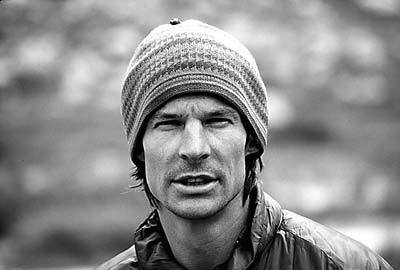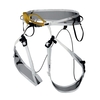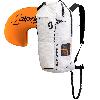Alexander Odintsov - interview after winning the Piolet d'Or 2004

 1 / 30
1 / 30 Alexander Odintsov
Alexander Odintsov
When it was my turn to meet Alexander Odintsov, during the encounters organised by Betta Gobbi of Grivel during the Piolet d'Or 2004, it seemed to me that I was face to face with an unknown entity: Russian mountaineering. Not so much for the incredible value of the achievement in itself (N face of Jannu for example), but more for the spirit , the motivation and the "culture" with which the Russians attempt a climb. And so, after having discussed it briefly with Alexander, we immediately decided to talk frankly, directly, without mincing with words. In many respects it turned out to be a astounding interview, but in the end one thing was clear for all: everybody has their own personal dreams and their own personal ways of seeing them come true. You have to learn to read them, understand them and respect them, even if you have differing ideas and a different approach to the mountains.
You carried out a first ascent on an extremely difficult face. Prior to the climb, did you consider the style of ascent? 10 mountaineers, 50 days, fixed ropes... could the North Face of Jannu have been climbed in a different way?
In thirty years 25 teams from all over the world attempted to climb the direct line up the north face of Jannu: none succeeded. And you can be sure that they were amongst the best climbers in the world. Our main objective was to climb the mountain. Do achieve this we had to choose the best style of ascent, bearing in mind the level of mountaineering worldwide and the objective. Only 3 out of our 10 mountaineers didn't get injured, 7 had problems. It was a war. Had we been armed with 5 people, had our army been too small, then we would have lost before reaching the last section of the climb, the steepest. Had we attempted the face in alpine style then we would have had to live at 6500m for a month. In our situation, in the society of world climbers, all can understand that this was impossible.There were only 2 options: either we had to have extremely strong team members, stronger than normal climbers, or we had to move quickly. there is no human being that combines these two factors. There is no human being who can live above 7000m for such an extended period of time, on a wall such as Jannu, and with those difficulties. It is not humanly possible.
Was there a moment when you thought you wouldn't succeed?
We planned everything so as to succeed, and right from the start we had envisaged all possible problems, also because we had all the information from everyone who had attempted the wall before us. We knew everything about the difficulties and the misfortune of the other teams that had preceded us. Every attempt had a reason for failure. on the basis of this analysis and these experiences we chose the best way to approach and resolve this problem.
You planned everything... but the must be another "secret." Was it the team, its desire? How did a 10 man team manage to work so intensely, and in harmony to reach this goal?
None of us are young, we all grew up in the Soviet era. We're used to working as a team and the prime objective of the team is to reach this objective. Man slips into second place. What you want is of secondary importance.
I'll make no secret: you're answer has pinned me to my seat.
When you understand that freedom cannot exist, then this in itself is a certain type of freedom.
Can you explain this concept better...
If you understand that freedom is not eternal. That freedom cannot be timeless, that your personal freedom can be removed, then you become more free than before. Don't you think that the freest people are criminals? Because they have all forms of freedom, they can even go and kill someone...
So the concept is: to reach the objective everyone decides to lose some personal freedom, because reaching this objective gives greater freedom to all
Yes!
Thank you for having discussed this "problem" so sincerely. but I would like to know something about your joy when you reached the summit...
There was no joy at all. Because where we suffered most was during the descent from the summit.
Yes, I understand. But I was enquiring about the joy afterwards, at base camp
We were all so exhausted that there was no time to celebrate: we had to go to Kathmandu. And on our way there we encountered the Maoists and we had some problems. During the entire expedition and before returning to Moscow I was very "closed", compressed into my own heart. I think we digested and realised what we had done only two months afterwards... Do you know what it is like to dream?
Yes, I can imagine what it's like...
The North Face of Jannu was a dream for all, for many generations of mountaineers, for the best in the world. This means that we too realised this dream. And what happens to people who realise their dreams? They are unhappy. What should they do next?
After this answer I immediately have to think about the fact that if historically speaking you have a Soviet education, on the other hand you are fruit of that Russian soul which is transmitted to us by the great Russian authors...
The Soviet mentality and the Russian culture are in stark contrast... But certainly what you say is right.
One last question: Russian mountaineers are perhaps some of the few who still manage to suffer and therefore reach great summits?
No, all mountaineers are ready to suffer hardship, regardless of their nationality- The difference between the Russians and the rest of the world is that we are organised better. For example, imagine a team with Huber, House, Humar etc. it would be an excellent team, but each one of them is not ready to give up something of their own personality.
Alexander Odintsov (expedition leader)
Alpinists: Alexander Ruchkin, Serguey Borissov, Michka Mikhailov, Guecha Kirievski, Mikhail Perchin, Kolia Totmianin, Alexei Bolotov, Euvgeni Prilepa, Dimitri Pavlenko (Russia), for the first ascent of a direct line up the North Face of Jannu 7710m, Nepal.
JANNU, 7710m, Nepal
Direct Russian, first direct line via the North Face
Length: 3000 m.
Grade: VI, rock 6c, ghiaccio 80°, mixed M6, aid A3+.
Time: 55 days total.
Ascent/descent: 50 days on the route.
Style: Fixed ropes, capsule style in the upper section



 Copia link
Copia link



















 See all photos
See all photos
























